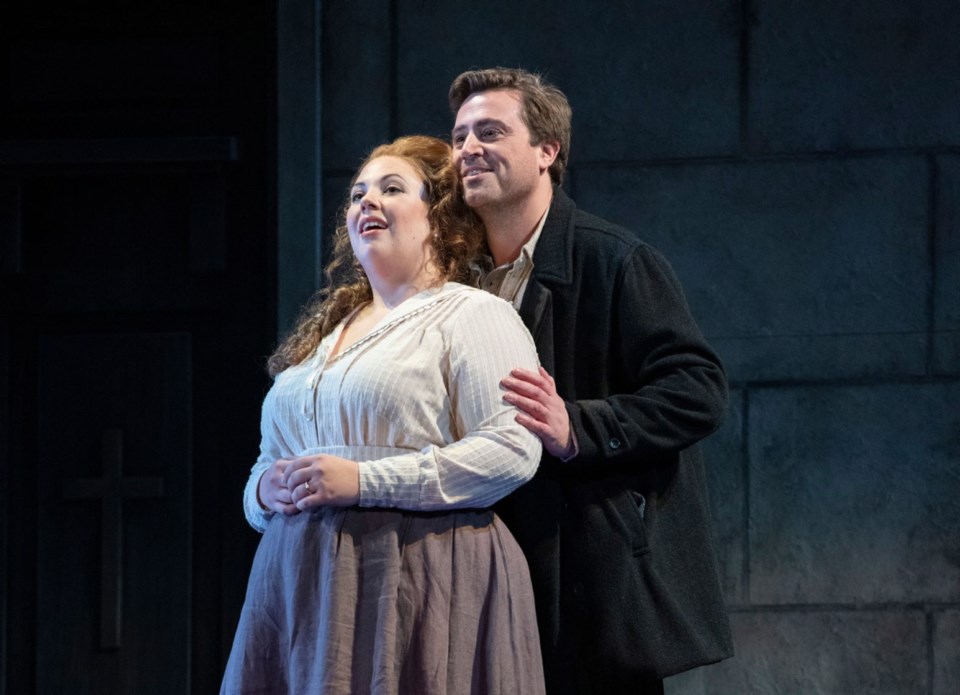Puccini’s Il Trittico seemingly has it all: a jealous murderous husband, a crazed suicidal nun and gut-busting Marx Brothers-style laughs.
Overall, it’s a delicious dog’s breakfast of operatic excess and, in the hands of Pacific Opera Victoria, a superb evening that cannot be missed.
In reviving Il Trittico at the Royal Theatre, POV has made Canadian opera history. The triptych of one-act operas — Il Tabarro, Suor Angelica and Gianni Schicchi — has been staged as a complete evening just once before in this country, by Opéra du Québec in 1971.
Internationally, Il Trittico is rarely revived as a complete set. Gianni Schicchi, the most popular piece, is typically carved off and presented with other short works.
Opera companies are daunted by the wildly divergent styles of each segment — Il Tabarro is a grim tragedy. Suor Angelica is sentimental and mystical, while Gianni Schicchi is a commedia dell’arte romp.
It’s a long evening — 31Ú2 hours with intermissions. And then there’s the budget-busting logistics of the thing. Each opera is set in a different time and locale, so each requires its own set.
Director Glynis Leyshon addresses this by setting everything in 1918, the same year Il Trittico premièred at the Metropolitan Opera. The approach allows POV to stage three operas using variations of the same set.
Providing this continuity in time and place gives the evening a certain cohesion. Meanwhile, Pam Johnson’s imaginative and detailed set design and costumes are nothing short of brilliant.
The notion is that it’s the end of the First World War. Il Tabarro has a wounded French soldier hobbling along the banks of the Seine. The nuns in Suor Angelica tend to wounded veterans in a convent-turned-hospital. Later, the hospital hosts a ribald evening of entertainment, Gianni Schicchi, as a treat for the war heroes.
Almost miraculously, given the sprawling ambitiousness of the project, everything in Il Trittico worked on Thursday night. The singing and acting were first rate, with soprano Aviva Fortunata especially impressive.
Under Timothy Vernon’s baton, the Victoria Symphony nimbly navigated a cornucopia of musical styles with sensitivity and attention to dynamics. And Leyshon’s bold directorial approach — intelligent, lively, unceasingly entertaining — is a testament to her considerable talent.
For a modern audience, Suor Angelica is the most problematic of the three works. It is deeply religious, highly melodramatic and unfashionably maudlin.
Born to an aristocratic family, Sister Angelica (Fortunata) was dispatched to a nunnery as punishment for having a child out of wedlock. Her aunt visits after seven years to not only demand Angelica’s inheritance, but pass along bad news: Angelica’s beloved son died two years before.
Leyshon does several notable things with Suor Angelica. The heartless aunt (the excellent mezzo soprano Megan Latham) is presented almost as an automaton, stalking the stage with stiff, geometrical movements, never catching her niece’s eye. The effect is surreal and dehumanizing — almost like a Magritte painting — and contrasts wonderfully with Angelica’s over-the-top despair.
Even better is the depiction of Suor Angelica’s potentially problematic climax. Angelica gulps poison so she can join her son in heaven, then realizes committing a mortal sin means she’ll go to Hades.
She cries out to the Madonna, who not only mysteriously materializes, but also brings the spirit of Angelica’s son. Such high-octane Victorian melodrama is potentially a kitsch minefield of nuclear proportions.
The surprise Leyshon and Johnson provide for the Madonna/son sequence cannot be revealed without ruining the fun — but trust me, it’s both deliriously campy and replete with breathtaking beauty.
Indeed, it’s one of the most wonderful operatic moments I’ve experienced. Fortunata’s heart-rending Senza mamma, one of Puccini’s finest arias, was tremendous, sung with creamy lyricism and thrilling high notes.
Il Tabarro’s set is terrific, featuring a patinated riverboat moored in front of a stone-walled hospital in Paris. Fortunata sang well as Giorgetta, the cheating wife, displaying a rounded, velvety timbre and fine projection with no hint of stridency.
Latham, as La Frugula, impressed with her vivacity and clear, keening voice. Tenor Adam Luther, well cast as the handsome lover Luigi, also had fine moments (especially when duetting with Fortunata), although occasionally his tone had a certain thinness.
Brandishing a black cloak as Giorgetta’s husband Michele, baritone Todd Thomas was a powerful presence, capturing his character’s tenderness and anguish.
His robust singing also shone as the cunning Gianni Schicchi.
For this comic opera, the sombreness of the evening’s previous offerings is flung aside, with characters sporting half-masks and outlandish Louis XIV-style costumes in purple, orange, green, red and turquoise.
Leyshon’s gift for comedy is apparent here. The opera is chock full of kooky stage business. Underneath the unrelenting hijinks (at one point a dead body is tossed around the stage) are rivers of beautiful melodies.
There is the famous O mio babbino caro, sung by soprano Lara Ciekiewicz with lightness and beautiful phrasing. Tenor Owen McCausland’s paean to Florence was also well sung.
Yet Gianni Schicchi boasts wonderful music throughout. In contrast to the seraphic delicacy of Suor Angelica and the solemnity of Il Tabarro, here Puccini grafts the risible exploits of greedy townsfolk to a succulent, sunny score with woodwinds and strings that ripple and roll.
Il Trittico continues at the Royal Theatre tonight, Oct. 23, 25 and 27.



